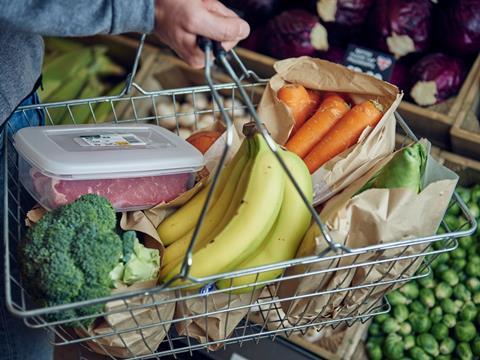
Morrisons has set its sights on reducing, replacing, or eliminating plastic and promoting reuse and recycling in its stores – aiming for the complete elimination of ‘problematic plastic’ and 30% recycled content for all its own-brand primary plastic packaging by 2025.
Since its 2017 baseline, Morrisons claims to have reduced its plastic packaging by 17.5% in 2022, totalling an average of 9,680 tonnes of plastic removed every year. It attributes the change to recent projects, including the expansion of its loose fruit and vegetable products – reaching up to 75 varieties across 332 stores.
Similarly, its own-brand bananas have transitioned into paper bands in a move said to spare 180 tonnes of plastic, or 45 million single-use plastic bags. A reported 400 tonnes of plastic have been removed from the retailer’s mince meat trays and 110 tonnes from its bread bags amidst its lightweighting efforts.
In line with its commitment to the UK Plastics Pact, the retailer claims that it has removed one billion single-use plastic items from its locations. Included in this figure are 331 million plastic tea bags, with plant-based alternatives being rolled out for its own-brand range, and 31.2 million single-use cutlery items across its food-to-go and salad bar offerings; and 80 million plastic straws from its cafes, drink cartons, and boxes of straws.
In their place, Morrisons only provides metal or paper drinking straws. Its own-brand cotton buds have also transitioned into an entirely paper-stem range.
Expanded polystyrene, black plastic, rigid PVC, and other hard-to-recycle plastics are being removed from its own-brand products, and Morrisons says that over 6,000 tonnes of non-recyclable plastics have been eliminated as a result.
Recycling instructions have been added to the front of the packaging for its top 400 lines. With 86% of all its plastic packaging currently described as recyclable, around 500 million products sold each year now feature guidance as to where consumers can return their packaging to Morrisons stores if it cannot be recycled at home.
Additionally, Morrisons has replaced its ‘bag for life’ with a paper alternative. According to independent analysis from the University of Sheffield, the bag offers better environmental performance than the plastic alternative. The new bag is made in Wales with paper sourced from sustainably managed forests and is able to carry weights of up to 16kg.
In pursuit of reuse and refill, consumers are offered a 25p discount if they bring their own cups to Morrisons cafes. They are also encouraged to bring their own containers to its butcher, fishmonger, and deli counters, and water refill stations have been set up in stores and forecourts.
The retailer has announced its work with local dairy farmers to sell milk in returnable glass bottles – a move thought to have saved 40,000 plastic milk containers annually. It also seeks to ensure the reusability of plastic trigger bottles by selling its cleaning products in water-soluble pods.
By 2025, Morrisons lists its workstream objectives as a complete elimination of ‘problematic plastic’, as defined by the UK Plastics Pact; 100% recyclability, reusability, or compostability for all its own-brand plastic packaging; an average of 30% recycled content across its own-brand primary plastic packaging; and, compared to figures from 2017, a 50% reduction in its own brand primary plastic packaging.
Other efforts from Morrisons include its partnership with Podback to introduce convenient recycling points for coffee machine pods at 29 of its stores; and its co-ownership of a recycling site for hard-to-recycle soft plastics in Scotland, operated by Yes Recycling.
Another UK retailer, Tesco, recently backed a government ban on packaging for fruit and vegetables – aiming to level the playing field between market competitors in the reduction of waste. However, other organizations have warned against selling fresh produce loose and express their concerns about consumer uptake, product quality, and more.
If you liked this article, you might also enjoy:
The L’Oréal approach to packaging sustainability
The way we talk about plastic needs to change – here’s how to get it right
What steps is Apple taking to make its packaging more sustainable?














No comments yet